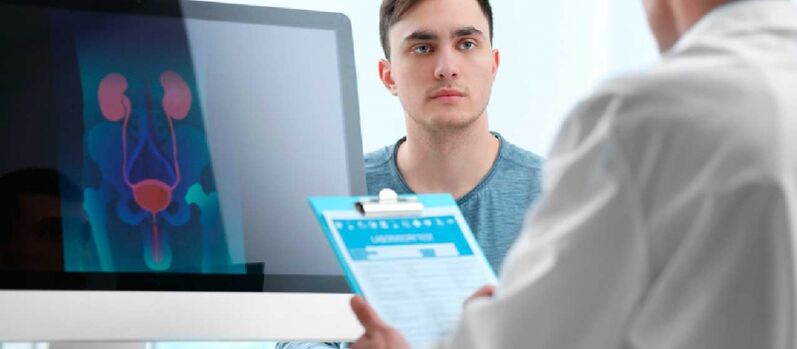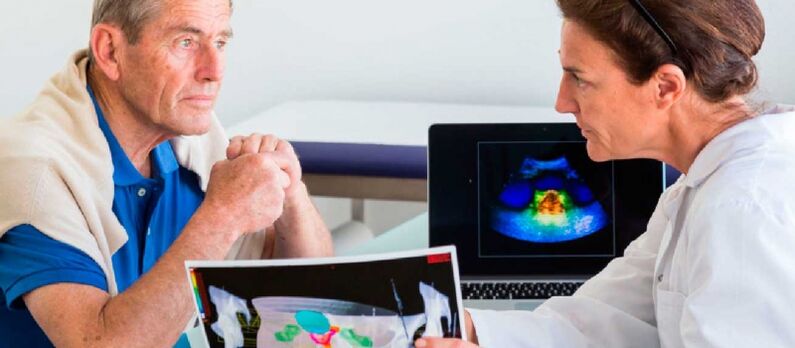Prostatitis is often referred to as an inflammatory process that occurs in the male prostate. The disease has unpleasant symptoms and is fraught with the development of complications, one of which is infertility. So what is prostatitis, and how harmful is this disease to the health of the male genitourinary system? With these questions, it is recommended to contact a urologist. This doctor will tell you why prostatitis occurs, what disease prostatitis is, and how to properly treat it.
Lack of timely medical care can cause inflammation to turn into a chronic form. Treatment should be started immediately when symptoms of prostate disease appear. Otherwise, infection can lead to dangerous consequences, including tissue proliferation. Since it is difficult to cure acute prostatitis on your own, contact your urologist immediately. In an unfavorable process, the disease causes inflammation of the structures of the testes, appendages, kidneys.
Development reasons
In modern men, damage to the prostate is not uncommon. Today, it is diagnosed as a separate disease and one of the symptoms of urinary disorders - urethritis, prostate adenoma, cancer, kidney disease.
The etiology of prostatitis is usually related to the role and predisposing factors of infectious agents. Inflammation is caused by Staphylococcus, Escherichia coli, Enterococcus and other common pathogens. It is important to determine the cause of prostatic inflammation so that effective drug therapy can be selected.
high-risk groups

At risk are people with weakened immune systems, sexually transmitted diseases, genitourinary damage, and the habit of holding back urine. Not all men know why prostatitis is dangerous, what it is and what factors contribute to the development of the disease. A flippant attitude toward one's health often leads to a lengthy course of the inflammatory process. The educational work of urologists helps to develop a correct understanding of diseases such as prostatitis and their possible consequences.
predisposing factors
Urologists pay special attention to possible causes of prostatitis: treatment is more effective if the main predisposing factor is affected. This will help significantly reduce the risk of periodic deterioration of the inflammatory process.
Possible causes of prostate disease:
- worsening kidney disease;
- Urogenital damage;
- low temperature;
- increased radiation exposure to the body;
- Spread infection from other pelvic organs;
- Violation of the usual rhythm of sexual activity;
- remain seated for long periods of time;
- Compression of the genitals with tight underwear, pants and jeans;
- the development of diseases of the urinary system, infections with venereal infections;
- chronic stress;
- General suppression of the immune system.
If you have prostatitis, the cause of the disease should be determined by a qualified specialist. First, you need to contact a urologist. He will conduct the examination and prescribe a full examination.
Blood stasis is the main cause of prostatitis
Effective treatment of prostatitis at home is not possible without eliminating the factors that contribute to the process of pelvic stagnation. Poor blood flow leads to fat peroxidation, the release of exudates, and the appearance of swelling inside the glandular tissue. This creates favorable conditions for the active reproduction of pathogenic microorganisms. Once you have identified the possible causes of inflammation, you can learn how to cure prostatitis at home without turning the disease into a dangerously chronic form.
diagnosis method
To understand how to treat prostatitis in a particular man, a diagnosis is necessary. Only then can you choose certain medicines and techniques. Based on the results of laboratory and instrumental studies, urologists can determine how to treat prostatitis in men and how to prevent future recurrences.
The main diagnostic methods of prostate inflammation:
- measure the level of PSA in the blood;
- Prostate ultrasound;
- Laboratory diagnosis of blood and urine;
- ureteroscopy;
- cystoscopy;
- Rectal examination of the glands;
- Urodynamic studies (cystometry, profilometry, uroflowmetry).
Comprehensive diagnosis can help to quickly select an effective prostatitis treatment at home, prescribing drugs designed to destroy specific infectious agents.
PSA test
The PSA test not only helps detect cancerous processes in the glands, but also helps monitor the effectiveness of treating diagnosed tumors and inflammation of the prostate. This approach can improve the effectiveness of treatment and reduce the risk of complications.
Therefore, PSA screening, although a controversial type of early diagnosis of prostate cancer, allows you to start treatment on time in most cases, which is undoubtedly very important for people with chronic inflammatory and proliferative processesof.
Combined with other diagnostic methods that screen for false results from prostate exams, the PSA test is a fairly high-quality method for preventing cancer and monitoring ongoing treatment. If there are multiple positive results, prostate tissue is removed for further biological testing.
symptoms of disease
Prostatitis in men can have a variety of symptoms, depending on the stage of the disease. The acute form of the disease occurs most often in the context of pelvic organ infections and proceeds relatively easily, without symptoms of intoxication and fever. If a man develops these signs of prostatitis, he should contact a urologist immediately so that treatment can be started in time to avoid complications.
Acute prostatitis is characterized by the following symptoms:
- frequent, painful urination;
- Pain in the sacrum, genitals, and perineum;
- Increased pain syndrome during defecation, sexual intimacy;
- increased body temperature;
- A feeling of a full and partially empty bladder (due to the inflamed prostate pressing against the ureter);
- Intoxication intensifies, muscle and joint pain occurs;
- Urinary retention is possible.

If you have one or more possible signs of prostate inflammation, you should contact a specialist. Even if the health is satisfactory, the pathological process can eliminate the signs, but at the same time it can cause complications.
The course of chronic prostatitis
Chronic inflammatory processes can proceed almost asymptomatically. Men may experience mild pain when urinating, mild lethargy, chronic fatigue syndrome, and sexual dysfunction.
Men note the following pathological signs (depending on the form and stage of the inflammatory process):
- pain when urinating;
- partial or complete urinary retention;
- Sacral, perineal pain;
- increased body temperature;
- severe weakness, impaired performance;
- Painful bowel movements;
- Decreased libido, impotence.
Erased pictures of chronic diseases mislead patients and delay urologist visits, which can lead to the development of complications: prostate swelling, acute urinary retention, prostate abscess, inflammation of the testicles and seminal vesicles, which often lead to irreversibleMale infertility.
The clinical manifestations of prostate inflammation vary according to the stage of the disease. If the process develops for the first time, the patient experiences severe discomfort, pain in the pubis and perineum, complaints of pain, frequent urination. Body temperature may rise and pus may drain from the urethra. In the absence of medical attention, the pathological process may be complicated by sepsis, pyogenic abscess of the prostate, seminal vesiculitis, inflammation of the testis and its appendages (epididymo-orchitis).
treat prostatitis
Prostatitis is treated at home. Septic complications and severe toxic syndrome require hospitalization. Experts prescribe antibiotics (considering susceptibility), anti-inflammatory treatment. After the acute process subsides, physiotherapy, prostate massage is performed.
Since prostatitis can be treated at home only after consulting a doctor, no folk remedies and methods should be used without the permission of a urologist. Unconventional methods are especially dangerous in severe cases. Home treatment of prostatitis can lead to pathological transformation into a relapsing chronic form.
medical treatement
How to effectively cure prostatitis with drugs? If the choice of drugs takes into account the nature of the disease, they may be effective. Laboratory tests can be used to identify infectious agents. It is best to consult a urologist about how to treat your prostate.
Among these drugs, the following groups of drugs are used:
- antibiotic;
- analgesics;
- diuretics;
- Anti-inflammatory (medicine.
Medications are prescribed for 2-4 weeks during the course. Good antibiotics with broad effects help destroy the infection in glandular tissue and prevent the infection from spreading. Treating chronic prostatitis at home can last up to 4-6 months. Initiated inflammatory processes are more difficult to heal and take longer.
physiotherapy
Physiotherapy is mainly used to restore adequate urine flow when the man's health returns to normal after eliminating the acute symptoms of the disease. The goal of physical therapy is to restore normal blood circulation. It is the deterioration of blood flow that contributes to the active reproduction of pathogenic microorganisms.
Physiotherapy is especially recommended in the chronic course of the disease. Experts prescribe laser treatments that have anti-inflammatory effects, stimulate local immunity, eliminate pain and discomfort, and destroy microorganisms. Also, for prostatitis, ultrasound and electromagnetic techniques are used. Medicinal micro-enemas can be prescribed with drugs that have therapeutic and curative properties.
prostate massage
How is prostatitis treated by massage? This method works, but is used a few weeks after starting treatment, and when the acute pain goes away, urination returns to normal. Massage should not be performed by inexperienced people. This can cause serious health hazards.
The technique is based on mild action on the prostate. Massage helps squeeze the accumulated inflammatory secretions into the ducts of the organ, from there into the urethra, and out of the body completely painlessly and safely. This method restores blood circulation to the pelvic organs and eliminates the prerequisites for the further reproduction of infectious microorganisms. Prostate massage works well for stalled processes and increases the effectiveness of antibiotics and other medications.
General advice
Lifestyle changes are recommended to avoid STDs, hypothermia, stressful situations. Men should ditch tight underwear that squeezes genitals and disrupts pelvic circulation. Regular sex is recommended, but beware of transmission of STDs through unprotected close contact.
Serious dietary violations can cause a recurrence of prostate inflammation. Do not abuse spices, spices, bacon and alcohol. It's also worth giving up espresso, overly salty dishes, and marinades.
Effectiveness of folk methods
Many people are interested and want to know how to cure prostatitis at home without the use of drugs. But drugs, especially antibiotics, are necessary for prostate inflammation. Only with their help is it possible to cure prostatitis at home without infectious complications.
There is a school of thought that antibiotics are unnecessary if the disease is causing hypothermia. Because most men have to treat prostatitis at home, they often refuse antibiotics in favor of traditional medicines. But hypothermia or other seemingly innocuous susceptibility factors create the prerequisites for E. coli, staph and other microbes to thrive.
Therefore, you should not even try to learn how to treat your prostate at home in unproven ways. This can be dangerous to men's lives and reproductive health.

























